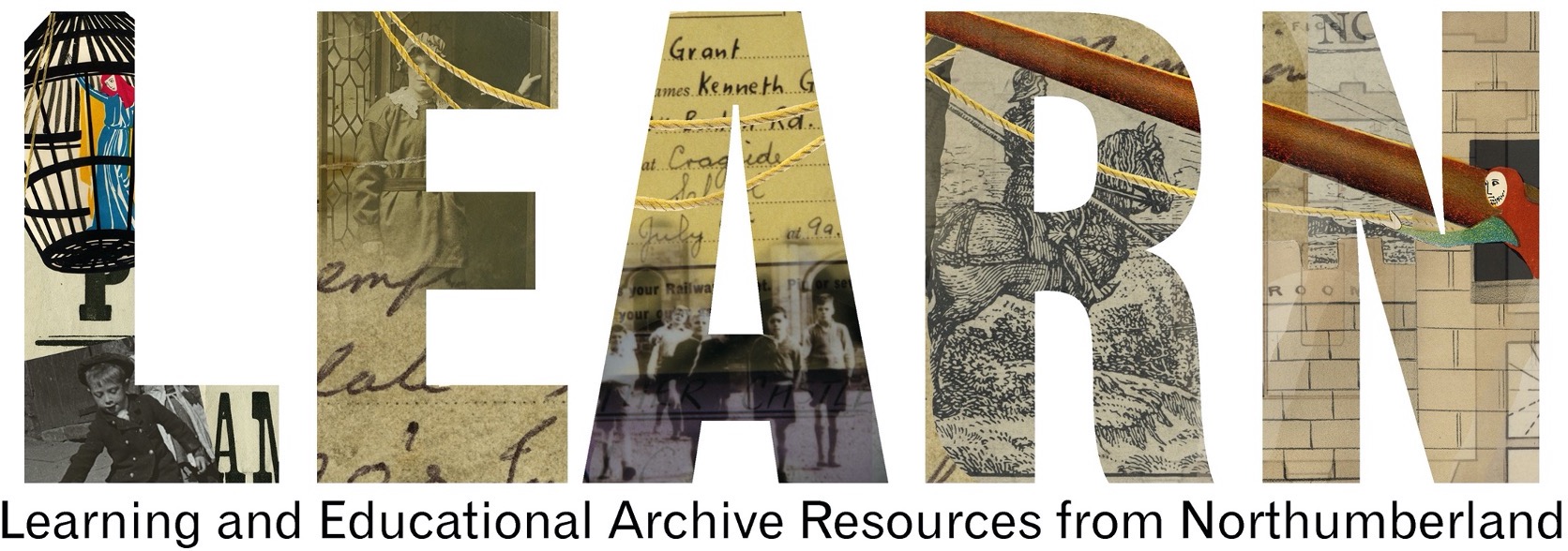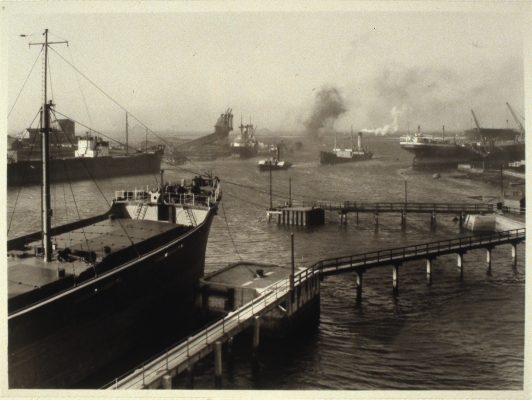Bombing of Blyth Oral Histories – Bernard F
Reference: T/438, NRO 5525/08/14
Suggested age groups: KS1, KS2, KS3, KS4, Lifelong Learners
Subject areas: WW2, Air Raids, Bombing of Blyth, Evacuees
Download Word Document
Download PDF
The photograph of Blyth Harbour has been provided by Blyth Harbour Commission.
Bernard F – T/438 – Part 1
Bernard F – T/438 – Part 2
CONTEXT
These sound files are extracts (short edited pieces) from longer oral history interviews preserved by Northumberland Archives. These interviews were made as part of a project to collect the memories of people who lived on the Northumberland coast.
For each person there is a short extract where they introduce themselves and other extracts where they talk about their experience of the bombing of Blyth during the Second World War.
Bernard was born in Blyth during the 1930s. He lived in Blyth for five years before moving away. Bernard mentions there being more seamen killed during the Second World War than any other branch of forces. The merchant navy were essential in keeping Britain supplied with food during the war and suffered high casualty rates. Bernard can recall two seamen being killed between Blyth and London. His grandfather and uncle worked at the harbour.
Although Bernard was evacuated from Blyth during the war (for five years), he talks about the bomb damage to the town. He describes where the bombs hit in relation to his contemporary landmarks: a bomb dropped on the railway shed where Morrison’s is now, and a lot of debris spread across the area. Bernard mentions a wheel or axel damaging the Roman Catholic Church window. Bernard mentions ships being targeted but does not recall the port itself being targeted.
ACTIVITIES
ACTIVITY 1
Background
Bernard was born in Blyth during the 1930s. He lived in Blyth for five years before moving away. Bernard mentions there being more seamen killed during the Second World War than any other branch of forces. The merchant navy were essential in keeping Britain supplied with food during the war and suffered high casualty rates. Bernard can recall two seamen being killed between Blyth and London. His grandfather and uncle worked on the harbour.
SEE
See: When was Bernard born?
See: Where was Bernard born?
See: When did Bernard leave Blyth?
See: How long was Bernard evacuated for?
See: Where did Bernard’s grandfather and uncle work?
See: Who does Bernard mention as suffering the highest casualty rates during WW2?
THINK
Think: Why do you think Bernard was evacuated?
Think: What types of places were children evacuated from?
Think: What types of places were children evacuated to?
Think: Why were so many seamen killed during WW2?
Think: What did the Merchant Navy do during WW2?
DO
Do: Write a diary from Bernard’s perspective about being evacuated from Blyth.
Do: Write a radio broadcast reporting on the bombing of Blyth during WW2.
Do: Design a stained-glass window commemorating the Navy war dead lost at sea.
Do: Script a conversation between Bernard’s uncle and grandfather talking about the war threat to ships and the port. Perform your script in pairs.
Do: Write a newspaper article about the significant of the Merchant Navy during WW2.
Resources
ACTIVITY 2
Background
Although Bernard was evacuated from Blyth during the war (for five years), he talks about the bomb damage to the town. He describes where the bombs hit in relation to his contemporary landmarks: a bomb dropped on the railway shed where Morrison’s is now, and a lot of debris spread across the area. Bernard mentions a wheel or axel damaging the Roman Catholic Church window. Bernard mentions ships being targeted but does not recall the port itself being targeted.
SEE
See: Where does Bernard mention being bombed in Blyth?
See: What types of bomb damage does Bernard describe?
See: What does Bernard say about ships and the port being targeted?
THINK
Think: What led to areas being targeted for air raids during the war? You could think about the geographical, environmental and industrial features of areas that were bombed.
Think: Why do you think Blyth was bombed during the war? You could use a map of Blyth to help you identify Blyth’s geographical, environmental and industrial features.
Think: Which other areas in the North of England do you think were targeted during air raids and why?
Think: How reliable do you think Bernard’s memories are of the bombing of Blyth? Why?
DO
Do: Look at the data gathered by the War, State and Society Bombing Britain website, can you sort the data so that you can only see the bombings that took place in the North of England?
Do: Using the data from Bombing Britain, create a map showing the places that were bombed in the North of England.
Do: Using the data from Bombing Britain, create a table showing the bombings that took place in the Blyth area.
Do: Using the data from Bombing Britain, create a table showing the number of casualties that occurred as a result of bombings in Blyth.
Do: Use Google Maps to look at the present-day locations in Blyth that Bernard mentioned suffered bomb damage. Can you see any evidence of these areas being restored? How different do you think they look now compared to how they looked during WW2?
Resources
ACTIVITY 3
Background
These sound files are extracts (short edited pieces) from longer oral history interviews preserved by Northumberland Archives. These interviews were made as part of a project to collect the memories of people who lived on the Northumberland coast.
For each person there is a short extract where they introduce themselves and other extracts where they talk about their experience of the bombing of Blyth during the Second World War.
SEE
See: Why were these oral histories recorded?
See: Who took part in these oral history interviews?
See: What is included in the oral history extracts?
THINK
Think: What is an oral history?
Think: Why is it important to record oral histories?
Think: What is the value of oral histories?
Think: Who might use oral histories?
Think: How reliable are oral histories?
Think: What types of oral histories might be recorded?
DO
Do: Imagine you are about to interview a someone who experienced the bombing of Blyth for an oral history. Write down a list of questions or talking points that you might use to prompt them during the interview.
Do: Write down a list of events that have taken place during your lifetime that you think it would be important to create oral history records of.
Do: Write down a list of events that have taken place before your lifetime that you think it would be important to have oral history records of.
Do: Look at the British Library, British Library Sounds and Imperial War Museum websites. Can you find oral history recordings about the events from your lists?
Do: Think of an event that you have experienced first-hand. In pairs, interview each other about your chosen events and create oral history recordings.
Do: Imagine you are Bernard, choose one part of his oral history interview and write a diary entry from his perspective of one of the events he describes.
Resources
OTHER ONLINE RESOURCES
BBC Peoples War website, page with memories of Blyth: https://www.bbc.co.uk/history/ww2peopleswar/stories/00/a6825800.shtml
Port of Blyth website, page about the history of the port: http://portofblyth.co.uk/history/
Air Raids
Imperial War Museum website, page about air raid preparation: https://www.iwm.org.uk/history/how-britain-prepared-for-air-raids-in-the-second-world-war
Imperial War Museum, page about what to do in an air raid: https://www.iwm.org.uk/history/what-to-do-during-an-air-raid
Imperial War Museum website, page with example of a “siren suit”: https://www.iwm.org.uk/collections/item/object/30097186
War, State and Society website, page with Bombing Britain database: http://www.warstateandsociety.com/Bombing-Britain
Air Raid Shelters
The Guardian newspaper website, page about Anderson Shelters today (includes photos of them): https://www.theguardian.com/world/2018/aug/21/how-britains-abandoned-anderson-shelters-are-being-brought-back-to-life
Anderson Shelters website (lots of information and some personal stories): https://www.andersonshelters.org.uk/
Spartacus Educational website, page about Anderson Shelters (includes primary sources): https://spartacus-educational.com/2WWandersonshelter.htm
RAF Museum website, page about different types of air raid shelters: https://www.rafmuseum.org.uk/research/online-exhibitions/history-of-the-battle-of-britain/air-raid-shelter-protection.aspx
Merchant Navy
BBC Peoples War website, page about the merchant navy: https://www.bbc.co.uk/history/ww2peopleswar/timeline/factfiles/nonflash/a6652091.shtml
Imperial War Museum website, page about the Merchant Navy: https://www.iwm.org.uk/history/a-short-history-of-the-merchant-navy
Commonwealth War Graves Commission website, search page for war dead: https://www.cwgc.org/find-records/find-war-dead/
Oral History
Website for Oral History Society, includes definition of oral history: https://www.ohs.org.uk/
University of Leicester information sheet on oral history (pdf). Although the language isn’t the most accessible it does discuss value and reliability of oral histories: https://www.le.ac.uk/ur/emoha/training/no1.pdf
Website for Glasgow Women’s Library, blog discussing oral history project, includes definition: https://womenslibrary.org.uk/2017/08/09/what-are-oral-histories-and-why-are-they-important/
British Library website, page for oral history collections: https://www.bl.uk/collection-guides/oral-history
British Library Sounds website, includes oral history recordings: https://sounds.bl.uk/Oral-history
Imperial War Museum website page for oral history collections, one of the biggest oral history collections in the country. Many can be searched and listened to online: https://www.iwm.org.uk/collections/sound


